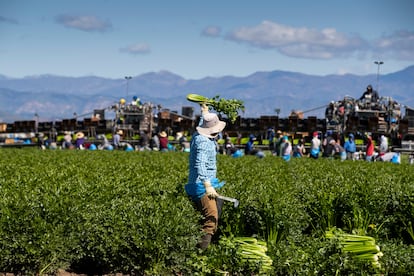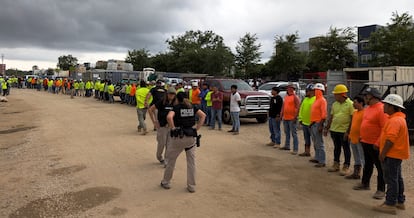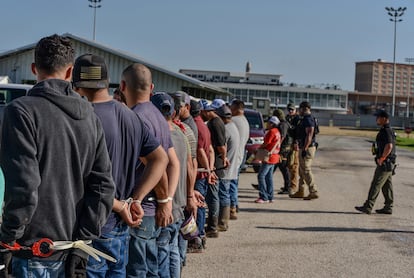Fear of raids paralyzes migrant farmworkers in Florida
Intense immigration operations are leaving farms empty and crops abandoned. Farmers warn that the crisis could collapse an essential industry

Half-an-hour south of Miami, in the Redlands, the landscape changes completely. Just 30 miles from the luxurious Brickell neighborhood and the famous Calle 8 and Little Havana – after passing the southwestern suburbs of the county – vast fields of crops stretch into the horizon. Nurseries of ornamental plants such as orchids and all kinds of palms appear one after another on both sides of the avenues and main streets, with signs advertising “nurseries.” The local residents, mostly Central American immigrants, who work in the fields, refer to these businesses as “nurserías.”
One of the nurseries is open: the entrance is an opening cut into the mesh fence. Once inside, you can’t see anyone, just rows of plants of different types and sizes, in black plastic pots. After a few minutes, an employee shows up. He’s Mexican and lives in a humble mobile home in the nursery. Outside the home, there’s a plastic table with white chairs, protected by a sunshade. Two children soon appear, then another, all looking on anxiously from a distance. The plants are for sale, the man notes, but at the moment, they aren’t delivering anything. He asks not to be identified, fearing the immigration authorities.
“I have a driver’s license and everything… but with the situation as it is right now, we’re not going out,” he apologizes.
A months-long crackdown on farms, construction sites and highways in Florida has generated a climate of fear among farmworkers, according to immigrant advocacy groups. Adjacent to the Redlands, in the city of Homestead – where 70% of the population is Hispanic and where most of the region’s farmworkers live – fear has entered people’s homes. Many avoid leaving their houses to go to work, to take their children to school, or even to go to the doctor. Residents explain that they fear being detained. The same story is repeated by residents, farm foremen, managers, nursery owners and immigration activists.
Florida is home to one of the largest populations of undocumented immigrants, estimated at 1.2 million. According to research groups, approximately half of the state’s farmworkers are immigrants and nearly half are undocumented.

Saúl Alemán, a landlord in Homestead, has tenants who are undocumented immigrants. Many have stopped going to work for fear of being detained. As a precaution, he has created an “action plan” for his properties that includes surveillance cameras “in case [ICE] shows up,” he explains.
Some of his tenants, whom he describes as very honest and hardworking people, are behind on their rent. “If they don’t have to go out, [if it’s not an] absolute necessity, they won’t,” Alemán notes. The 32-year-old landlord is also a pro-immigrant activist. He became an American citizen thanks to the DACA program, which was set up to provide a path toward citizenship for those who were brought to the United States as children.
“Imagine having a sick child and having to decide whether to take them to the emergency room [and] risk being detained, or stay home and pray for them to get better. That shouldn’t be happening in this community,” Alemán laments.
TikTok, Instagram, Facebook and other social media platforms are filled with posts warning about the presence of immigration authorities on roads, neighborhoods, or farms in the area. The hashtags include words such as “ICE,” “deportation,” or “immigration.”
“Immigration Alert – 12:34 AM. We’ve received intelligence that ICE is setting up checkpoints in the Robert Is Here (a fruit stand) and Benito Juarez Park area. Be very careful. Spread the word,” reads a Facebook post that has been shared more than 100 times in less than 48 hours.
Nedardo Viegues, 30, is a lifelong Redlands resident. He says that he’s never seen a situation like the one he’s experiencing now. Like many in the area, he works at a nursery that his parents founded. The small business faces a “tough situation” due to the lack of employees. “We depend on immigrants,” he shrugs. “That’s what agriculture is.”
A patrol car arrived at his nursery last week. “There are a lot of Border Patrol [agents] in areas that are known to be used by immigrants, in the back streets. They know where to look for them, at the jobs that nobody wants,” Viegues points out.
Wages in the nurseries hover around $13 an hour, the state’s minimum wage. For that kind of money, there aren’t many people in the area willing to do the grueling farm work under the relentless Florida sun. A manager who prefers not to give his name explains that several of his employees have been with them for many years. They’re “good, hard-working people,” he emphasizes: they pay their taxes, have no criminal records and have American-born children. Among them, he explains, “there has always been a fear of immigration.” But now, the fear is “extreme.” One of the hardest hit services has been gardening, because the crews have to travel in trucks carrying easily-recognizable machinery. They’re being targeted by immigration authorities.
Ernesto Ruiz, coordinator of the Farmworker Association of Florida (FWAF), says that this situation is playing out all over Florida, in agricultural businesses of all sizes. Since 1983, the association has been advocating for fundamental protections and decent working conditions. It has about 20,000 members. “Florida is the state with the most agricultural production. Along with California, it’s one of the main economic engines [in the country]. It’s contradictory that [the state] has an anti-immigrant policy,” Ruiz sighs. The Department of Agriculture estimates that Florida generates nearly $9 billion annually from nurseries, crops, livestock and citrus, more than any other state.
The contradiction at the national level is evident, creating much confusion. Last month, President Donald Trump called for an end to immigration raids targeting undocumented immigrants working in the fields, processing plants, hotels and restaurants, calling the people “very good, long-time workers.” This came after facing pressure from the aforementioned industries. Less than a week later, however, the administration reversed course and called for the reinstatement of farm raids.
On an interview on Fox News, the president assured viewers that his administration is developing a temporary pass for immigrants working in certain sectors, such as agriculture. “We’re working on it right now. We’re going to [make] it so that [there’s] some kind of a temporary pass where people pay taxes, where the farmer can have a little control, as opposed to you walk in and take everybody away,” he claimed, without providing details. “We’re going to do something for farmers, where we can let the farmer sort of be in charge. The farmer knows. He’s not going to hire a murderer.”
The Department of Agriculture estimates that about half of the nearly two million agricultural workers in the United States lack legal status.
Griselda Payne, who works at FWAF’s office in Apopka, a city in central Florida known as “the indoor foliage capital of the world,” believes that farmworkers have historically been one of the most vulnerable groups in society. They’re often exploited, exposed to harmful pesticides, extreme heat and abuse, without legal protections. They’re sometimes unpaid, while some are victims of human trafficking. “Florida is one of the worst states to live in as a migrant farmer,” Payne sighs.
Her office, she notes, “is always full… but lately, not many people are coming in because of fear.” Entire plantations are lying abandoned in the area, with crops about to rot. Last week, a woman called in, desperately seeking help: she was bleeding and didn’t know what to do. “She didn’t want to go to the emergency room,” Payne says.
The impact of the Trump administration’s immigration policy has been particularly harsh in Florida. “In other states, governors and mayors are more attentive to the needs of immigrants. Many farmworkers are leaving for those states,” Ruiz notes.
In California, Democratic Governor Gavin Newsom has openly confronted President Trump for sending troops to quell protests against his immigration policy. In Florida, however, Republican Governor Ron DeSantis has pushed a rampant anti-immigrant agenda that appears to be even more extreme than the national agenda. A law promoted by DeSantis imposes severe penalties on those who employ unauthorized immigrants.

Hundreds of arrests have also been made in complex coordinated operations between local police departments and state and federal agencies, such as the Highway Patrol (FHP), Border Patrol (CBP), and Immigration and Customs Enforcement (ICE), under a program known as 287(g). DeSantis and Florida Attorney General James Uthmeier have promoted the program, reaching more than 200 agreements since the beginning of the year – the largest number in the country – including one with police departments in immigrant-majority cities such as Miami, Doral and Homestead. Uthmeier has also pushed for a law criminalizing the entry of undocumented immigrants into the state, which has been challenged in the courts.
Miami-Dade County election records show that the majority of Hispanics in Homestead are affiliated with the Republican Party. Homestead Police Chief Mario Knapp assures EL PAÍS that ICE isn’t conducting raids or immigration checkpoints in Homestead. He claims that they’ve only entered the city twice in the last month, heading to “specific addresses” as they search for individuals with criminal charges.
As a result of the 287(g) program, many people cannot distinguish between different authorities and, as a result, distrust everyone. Homestead residents, workers, and nursery owners report that they’ve seen unprecedented activity by ICE, CBP, FHP and the county police. Patricio Lugo, who runs a nursery, hasn’t seen the authorities, but has “heard that they’re on the streets arresting people,” stopping cars and searching them. “Word is spreading and people are starting to get alarmed,” he says.
The H-2A visa program allows agricultural businesses to hire foreigners, but many complain about the high cost, which stands at about $1,130 per person, plus additional expenses such as consular fees, transportation and housing. Although the number of visas has tripled in the last decade, with 378,000 issued in 2023, they barely make up 20% of the industry’s workers, according to official figures. “[Things are] very expensive for farm owners,” explains Ruiz, from the Farmworker Association.
Arturo López is the executive director of the Homestead-based Coalition of Florida Farmworker Organizations (COFFO), which provides legal assistance, training and community services to farmworkers and their families (only to those with legal status, as COFFO receives federal funding). He says that the collective has considered changing its name, because farmworkers are dwindling in the region. “In about four or five years, we won’t have this organization, because there won’t be any farmworkers who qualify for these programs. Those who were here are already very old and can’t work. And their children don’t want to do this work. What [the companies] are doing is looking for H-2A workers,” he adds.
The owner of a nursery in Homestead who requested anonymity for fear of retaliation explains that the cost of H-2A is prohibitive for small businesses. “The nursery business doesn’t make much money. At the end of the day, immigrant labor is necessary,” he emphasizes. Viegues, whose family has owned their nursery for generations in the Redlands, believes that “soon, there won’t be any plants” for the new developments being built in Miami. “We can’t pay more and [nobody with documentation] wants to work for that wage.”
“It’s a shame, because there isn’t land like what we have here in the Redlands. If no one wants to work these farms, we won’t have this fruit, these avocados,” he says regretfully. “In the end, the pressure is political.”
Sign up for our weekly newsletter to get more English-language news coverage from EL PAÍS USA Edition
Tu suscripción se está usando en otro dispositivo
¿Quieres añadir otro usuario a tu suscripción?
Si continúas leyendo en este dispositivo, no se podrá leer en el otro.
FlechaTu suscripción se está usando en otro dispositivo y solo puedes acceder a EL PAÍS desde un dispositivo a la vez.
Si quieres compartir tu cuenta, cambia tu suscripción a la modalidad Premium, así podrás añadir otro usuario. Cada uno accederá con su propia cuenta de email, lo que os permitirá personalizar vuestra experiencia en EL PAÍS.
¿Tienes una suscripción de empresa? Accede aquí para contratar más cuentas.
En el caso de no saber quién está usando tu cuenta, te recomendamos cambiar tu contraseña aquí.
Si decides continuar compartiendo tu cuenta, este mensaje se mostrará en tu dispositivo y en el de la otra persona que está usando tu cuenta de forma indefinida, afectando a tu experiencia de lectura. Puedes consultar aquí los términos y condiciones de la suscripción digital.








































